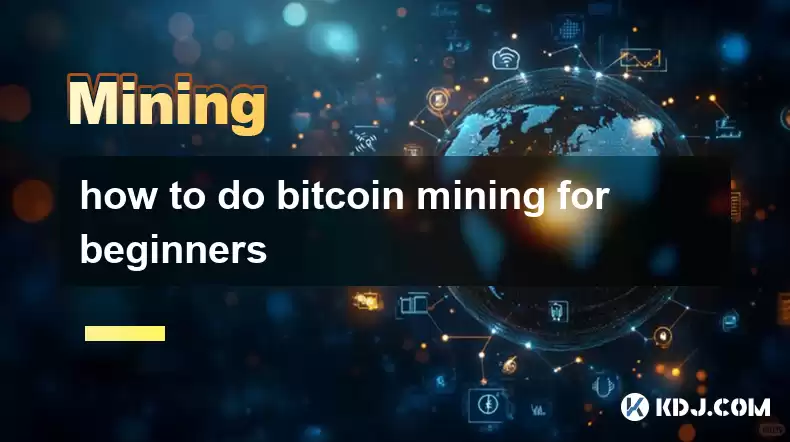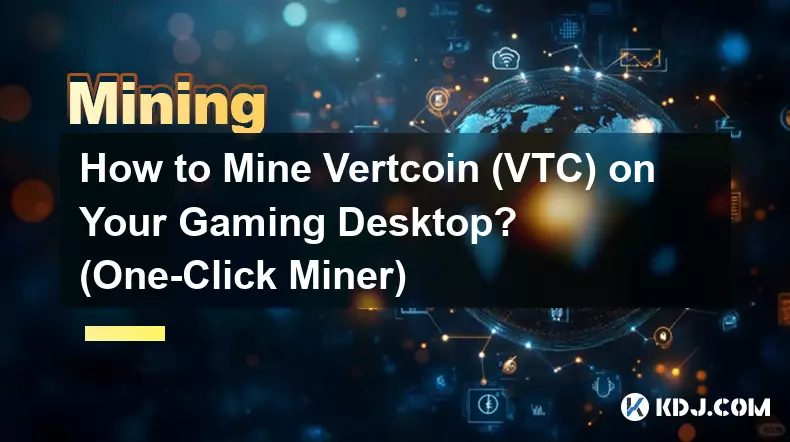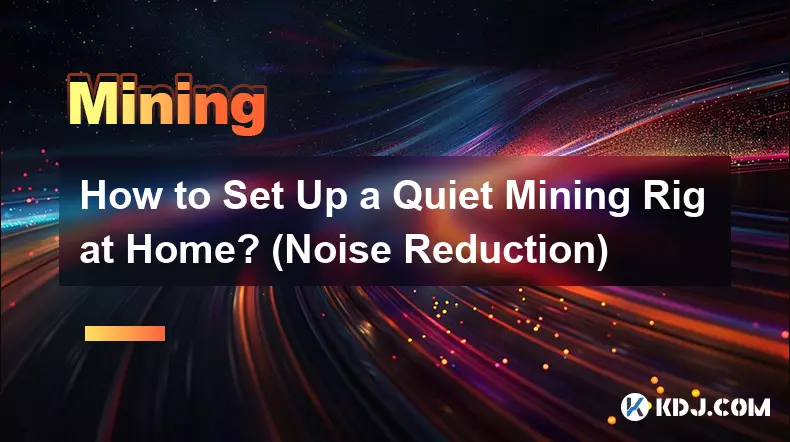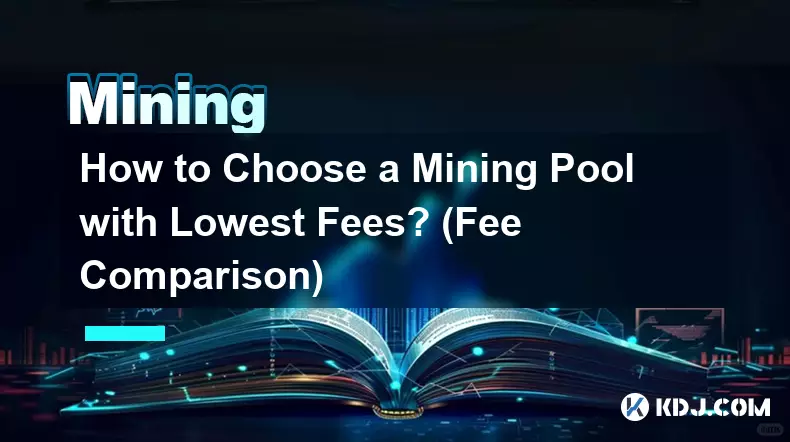-
 bitcoin
bitcoin $87959.907984 USD
1.34% -
 ethereum
ethereum $2920.497338 USD
3.04% -
 tether
tether $0.999775 USD
0.00% -
 xrp
xrp $2.237324 USD
8.12% -
 bnb
bnb $860.243768 USD
0.90% -
 solana
solana $138.089498 USD
5.43% -
 usd-coin
usd-coin $0.999807 USD
0.01% -
 tron
tron $0.272801 USD
-1.53% -
 dogecoin
dogecoin $0.150904 USD
2.96% -
 cardano
cardano $0.421635 USD
1.97% -
 hyperliquid
hyperliquid $32.152445 USD
2.23% -
 bitcoin-cash
bitcoin-cash $533.301069 USD
-1.94% -
 chainlink
chainlink $12.953417 USD
2.68% -
 unus-sed-leo
unus-sed-leo $9.535951 USD
0.73% -
 zcash
zcash $521.483386 USD
-2.87%
how to do bitcoin mining for beginners
Bitcoin mining demands substantial upfront investment, efficient hardware, and low electricity costs. Joining a pool boosts earnings, but price volatility and ongoing maintenance are key considerations for profitability.
Mar 22, 2025 at 11:42 am

- Bitcoin mining requires understanding of the underlying technology and significant upfront investment.
- Choosing the right mining hardware is crucial for profitability.
- Joining a mining pool significantly increases your chances of earning Bitcoin.
- Electricity costs are a major factor in profitability; consider your location carefully.
- Software setup and maintenance are ongoing requirements for successful mining.
- Understanding Bitcoin's price volatility is essential for managing expectations.
Bitcoin mining, the process of verifying and adding transactions to the blockchain, is a complex but potentially rewarding endeavor. For beginners, however, it's crucial to understand the significant challenges involved before diving in. This article aims to provide a comprehensive guide, demystifying the process and addressing common questions.
Understanding the Basics of Bitcoin MiningBitcoin mining involves solving complex mathematical problems using specialized hardware. The first miner to solve the problem adds the next block of transactions to the blockchain and receives a reward in Bitcoin. This reward, currently 6.25 BTC, is halved approximately every four years. The difficulty of these problems adjusts automatically to maintain a consistent block generation time of roughly ten minutes. This ensures the network's security and stability.
Choosing Your Mining HardwareFor beginners, Application-Specific Integrated Circuits (ASICs) are the only realistic option. ASIC miners are specifically designed for Bitcoin mining and are significantly more efficient than CPUs or GPUs. Factors to consider when choosing an ASIC include hash rate (measured in TH/s or PH/s), power consumption (measured in watts), and price. Research thoroughly before purchasing, comparing specifications and prices from reputable vendors.
Setting Up Your Mining RigSetting up your mining rig involves several steps:
- Acquire your ASIC miner: Purchase from a trusted vendor and ensure it's compatible with your power supply.
- Connect your hardware: Connect the ASIC miner to a stable internet connection and power supply.
- Install mining software: Download and install mining software like CGMiner or BFGMiner. These programs control your miner and connect it to a mining pool.
- Configure your mining software: Configure the software with your mining pool's address and your wallet address.
Mining Bitcoin solo is extremely difficult and unlikely to yield profits for beginners. Joining a mining pool significantly increases your chances of earning Bitcoin. Mining pools combine the hashing power of multiple miners, sharing the rewards proportionally based on each miner's contribution. Popular pools include AntPool, F2Pool, and Poolin. Research different pools and choose one with a good reputation and reasonable fees.
Understanding Electricity CostsElectricity costs are a crucial factor affecting profitability. Bitcoin mining consumes significant amounts of electricity, and high energy prices can quickly negate any profits. Consider your location's electricity rates and explore options like renewable energy sources to reduce your costs. Calculate your estimated electricity consumption per day to get an accurate estimate of your operational expenses.
Monitoring Your Mining OperationRegularly monitor your mining operation to ensure everything is running smoothly. This includes checking your miner's hash rate, temperature, and power consumption. Monitoring your earnings and comparing them to your electricity costs is essential for determining profitability. Stay updated on software updates and security patches to maintain optimal performance and prevent potential issues.
Bitcoin's Price VolatilityBitcoin's price is highly volatile, meaning its value can fluctuate significantly in short periods. This volatility directly impacts the profitability of Bitcoin mining. A drop in Bitcoin's price can quickly make mining unprofitable, even with efficient hardware and low electricity costs. Understanding and managing this risk is crucial for anyone involved in Bitcoin mining.
Frequently Asked Questions:Q: Is Bitcoin mining profitable for beginners?A: The profitability of Bitcoin mining depends on several factors, including the price of Bitcoin, electricity costs, hardware costs, and mining difficulty. For beginners, the high initial investment and operational costs often outweigh the potential profits, making it a risky venture.
Q: What is the best hardware for Bitcoin mining?A: For beginners, ASIC miners are the most efficient option. Specific models vary in performance and price, so research is essential before purchasing. Consider factors like hash rate, power consumption, and price-to-performance ratio.
Q: How much does it cost to start Bitcoin mining?A: The cost varies significantly depending on the chosen hardware and electricity costs. Expect a substantial upfront investment in ASIC miners, power supplies, and potentially cooling systems. Ongoing electricity costs can also be significant.
Q: How long does it take to mine one Bitcoin?A: The time required to mine one Bitcoin depends on your hash rate, the mining difficulty, and the mining pool you join. It's impossible to give a definitive answer, as these factors are constantly changing.
Q: Is Bitcoin mining legal?A: The legality of Bitcoin mining varies by jurisdiction. In most places, it's legal as long as you comply with tax regulations and any applicable environmental regulations related to energy consumption. However, some jurisdictions have specific regulations or outright bans on certain mining practices.
Q: What are the risks involved in Bitcoin mining?A: The primary risks include the high upfront investment, fluctuating Bitcoin price, rising electricity costs, and the potential for hardware malfunctions. Additionally, the difficulty of mining increases over time, potentially reducing profitability. Finally, there are risks associated with security vulnerabilities in software and hardware.
Disclaimer:info@kdj.com
The information provided is not trading advice. kdj.com does not assume any responsibility for any investments made based on the information provided in this article. Cryptocurrencies are highly volatile and it is highly recommended that you invest with caution after thorough research!
If you believe that the content used on this website infringes your copyright, please contact us immediately (info@kdj.com) and we will delete it promptly.
- UAE Investor Secures Major Stake in Trump-Linked Crypto Firm Amidst Shifting Geopolitical Tides
- 2026-02-02 07:10:01
- Pepe Meme Coin: Navigating the Hype, Price Predictions, and Future Outlook in 2026 and Beyond
- 2026-02-02 07:05:01
- Blockchain Gaming's Quiet Revolution: Unpacking Latest Trends and Industry Insights Amidst Market Shifts
- 2026-02-02 06:30:01
- IPO Genie, Tokenization, and YouTubers: The Big Apple's Next Big Bet on Democratized Wealth
- 2026-02-02 06:40:02
- Aptos in a Bind: Downtrend Deepens, But a Brief Relief Bounce Looms Before the Next Plunge
- 2026-02-02 07:00:01
- Pi Network, ATL, and Community: Navigating the Currents of a Mobile-First Crypto Movement
- 2026-02-02 07:00:01
Related knowledge

How to Spot a Cloud Mining Scam? (Red Flags to Watch For)
Feb 02,2026 at 08:20am
Unrealistic Return Promises1. Platforms advertising guaranteed daily returns above 1–2% without disclosing underlying hardware, electricity costs, or ...

How to Earn Passive Income with DePIN Mining? (New Trend 2026)
Feb 01,2026 at 12:40pm
Understanding DePIN Mining Mechanics1. DePIN mining relies on real-world infrastructure participation rather than computational hashing. Users deploy ...

How to Mine Vertcoin (VTC) on Your Gaming Desktop? (One-Click Miner)
Feb 02,2026 at 03:39am
Understanding Vertcoin's Mining Algorithm1. Vertcoin uses the Verthash algorithm, which is intentionally memory-hard and designed to resist ASIC domin...

How to Set Up a Quiet Mining Rig at Home? (Noise Reduction)
Feb 01,2026 at 11:00pm
Acoustic Enclosure Design1. Use rigid, dense materials such as MDF or acoustic-grade plywood for the enclosure walls to block mid-to-high frequency no...

How to Choose a Mining Pool with Lowest Fees? (Fee Comparison)
Feb 02,2026 at 02:39am
Understanding Mining Pool Fee Structures1. Pool operators charge fees to cover infrastructure, maintenance, and administrative costs. These fees manif...

How to Mine Bitcoin on Mac (M1/M2/M3)? (Software Tutorial)
Feb 01,2026 at 07:19pm
Understanding Bitcoin Mining on Apple Silicon1. Bitcoin mining relies on solving cryptographic puzzles using computational power, and Apple’s M1, M2, ...

How to Spot a Cloud Mining Scam? (Red Flags to Watch For)
Feb 02,2026 at 08:20am
Unrealistic Return Promises1. Platforms advertising guaranteed daily returns above 1–2% without disclosing underlying hardware, electricity costs, or ...

How to Earn Passive Income with DePIN Mining? (New Trend 2026)
Feb 01,2026 at 12:40pm
Understanding DePIN Mining Mechanics1. DePIN mining relies on real-world infrastructure participation rather than computational hashing. Users deploy ...

How to Mine Vertcoin (VTC) on Your Gaming Desktop? (One-Click Miner)
Feb 02,2026 at 03:39am
Understanding Vertcoin's Mining Algorithm1. Vertcoin uses the Verthash algorithm, which is intentionally memory-hard and designed to resist ASIC domin...

How to Set Up a Quiet Mining Rig at Home? (Noise Reduction)
Feb 01,2026 at 11:00pm
Acoustic Enclosure Design1. Use rigid, dense materials such as MDF or acoustic-grade plywood for the enclosure walls to block mid-to-high frequency no...

How to Choose a Mining Pool with Lowest Fees? (Fee Comparison)
Feb 02,2026 at 02:39am
Understanding Mining Pool Fee Structures1. Pool operators charge fees to cover infrastructure, maintenance, and administrative costs. These fees manif...

How to Mine Bitcoin on Mac (M1/M2/M3)? (Software Tutorial)
Feb 01,2026 at 07:19pm
Understanding Bitcoin Mining on Apple Silicon1. Bitcoin mining relies on solving cryptographic puzzles using computational power, and Apple’s M1, M2, ...
See all articles










































































